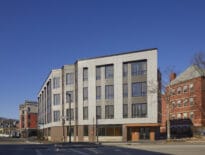Ted Chryssicas
Executive managing director, Newmark
Industry experience: 30 years
Retail tenants and landlords were navigating turbulent waters for much of the past decade as e-commerce disrupted the industry’s traditional brick-and-mortar channels. Then the COVID-19 storm appeared on the horizon in early 2020. As both sides searched for safe harbors, brokers stepped in to salvage long-time relationships and limit the wave of closings and vacant storefronts in shopping districts. Ted Chryssicas leads the retail team for brokerage Newmark in Boston. Chryssicas joined Newmark in 2015 following an 18-year stint at Colliers.
Q: How did the day-to-day routine of a retail broker change in mid-2020?
A: We were just guiding landlords and tenants dealing with each other on abatement and deferments of rent. It was a non-productive time for us from a monetary standpoint, but we were just trying to service the industry and it was in dire straits. We had a couple of deals that started from before COVID and then this hit and deals blew up. A big steakhouse deal blew up. It was getting hit in the head a few times. Most landlords were cooperative. There were very few who weren’t. Everyone was in the same boat.
Q: Are you now seeing a rebound in leasing activity similar to what we’re starting to see in the office sector?
A: There has been. I was on five showings yesterday and two today. The activity is there. We’ve got a lot of tenants looking to diversify and come up to Boston, versus having all their eggs in one basket. I try to advise my tenants not to expect any huge COVID discounts, but expect to get a better location than before. They understand it, but there’s still a big disconnect on the economics.
Q: What are the hardest-hit and most resilient submarkets in Boston?
A: The Financial District has been hit hard because there’s nobody down here except for the construction workers at 1 Post Office Square and Winthrop Center. Back Bay seems to be faring better than most. The Seaport has been weather-dependent. Faneuil Hall is crushed. We have a lot of listings in the Financial District and starting to have some luck on showings and the anticipation of people returning, but you’re at 5 percent occupancy in office buildings from a people standpoint. The big area that did well are the edge cities such as Allston-Brighton and Somerville. People live around there and they have to go out and get some things.
Q: What’s changed in what landlords and tenants want in lease clauses post-COVID?
A: No doubt about it: There’s reluctance but recognition there needs to be some type of pandemic clauses, depending on the size of the tenant and whether the landlord wants it, but it’s not easy. They have to realize that another pandemic could come down the road and how you deal with it. It’s got to be federally-mandated. There’s a provision for certain abatement or deferment of rent.
Q: Can movie theaters stage a comeback in the urban core following the closings in the Seaport and The Hub on Causeway?
A: The big AMCs and Regals could step in, but it’s got to be something special or luxury if they have a chance. I can’t see theaters in the traditional sense with nothing special about them being able to survive. It’s the product. They’re streaming directly. The nice thing about these centers is they are sitting on great real estate. You can do multifamily, lab, residential.
We see restaurants coming back with a vengeance. We thought everybody would be looking at second-generation space, but it’s the opposite. We didn’t think they would be looking at the virgin space until 2023. The dollars are out there for the right investment. Outdoor patios are critical. I don’t think anybody’s opening up without the ability to do an outdoor patio. And if you don’t, you remove a portion of the building.
On the retail end of things, we’re seeing a lot of direct-to-consumer companies that have thrived on the internet and looking to open some showrooms. I’ve got three of those deals. They come in and do 12 stores across the country. When they open a store in a market, their sales in the market, be it online or brick-and-mortar, goes up dramatically. One said sales go up 77 percent overall. They know where the sales are coming from. So that’s a great argument for bricks-and-mortar to continue to exist.
Q: Are licensing agreements replacing leases to a significant degree?
A: We’ve done two pop-ups. It all depends on the landlord and whether you want to go through the hassle of that. They can be problematic. I don’t think that’s the trend where everybody is doing it. They have shortened up lease terms. Your typical retail lease is 10 years. It depends upon the tenant improvement dollars and how big the building is. You can sign a couple of five-year leases if it’s a big building. The tenant improvements have almost doubled for restaurants. Rents have come down and we’re seeing a couple of deals coming in where there’s percentage rent for the first two years and then that’s converted into base rent. Compromises are taking places because there’s still a lot of unknowns.
Chryssicas’ Five Favorite 2020 Songs on Spotify
- “Lady Lie,” by Rainbow Kitten Surprise
- “All the Debts I Owe,” by Caamp
- “Hallucinogenics,” by Matt Maeson
- “Beautiful Mistake,” Tom Misch
- “No Good,” by KALEO




 |
| 


